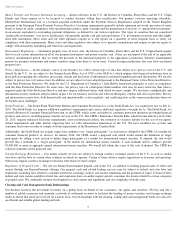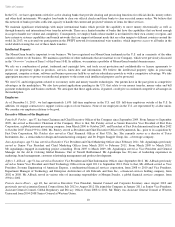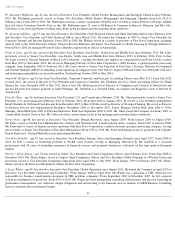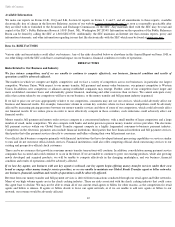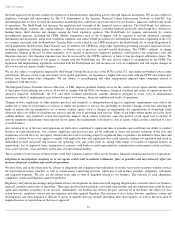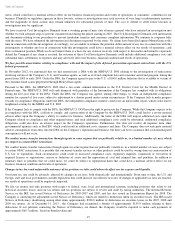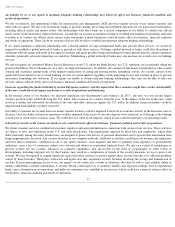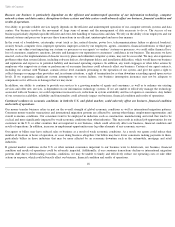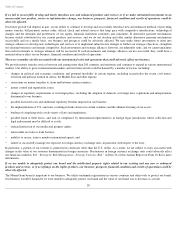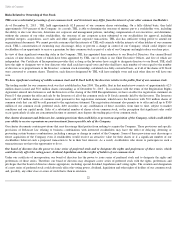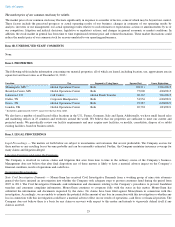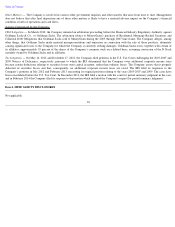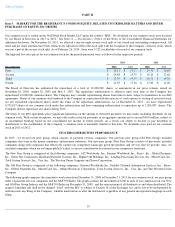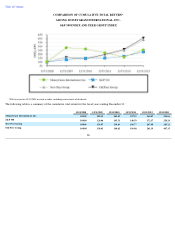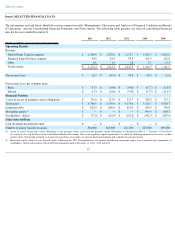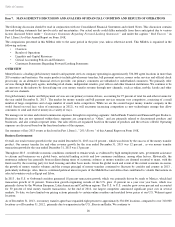MoneyGram 2013 Annual Report Download - page 21
Download and view the complete annual report
Please find page 21 of the 2013 MoneyGram annual report below. You can navigate through the pages in the report by either clicking on the pages listed below, or by using the keyword search tool below to find specific information within the annual report.
Table of Contents
A significant change, material slow down or complete disruption in international migration patterns could adversely affect our business,
financial condition and results of operations.
Our money transfer business relies in part on international migration patterns, as individuals move from their native countries to countries with
greater economic opportunities or a more stable political environment. A significant portion of money transfer
transactions are initiated by
immigrants or refugees sending money back to their native countries. Changes in immigration laws that discourage international migration and
political or other events (such as war, terrorism or health emergencies) that make it more difficult for individuals to migrate or work abroad
could adversely affect our money transfer remittance volume or growth rate. Sustained weakness in global economic conditions could reduce
economic opportunities for migrant workers and result in reduced or disrupted international migration patterns. Reduced or disrupted
international migration patterns, particularly in the U.S. or Europe, are likely to reduce money transfer transaction volumes and therefore have an
adverse effect on our results of operations. Furthermore, significant changes in international migration patterns could adversely affect our
business, financial condition and results of operations.
We face credit risks from our retail agents and financial institution customers.
The vast majority of our money transfer, bill payment and money order business is conducted through independent agents that provide our
products and services to consumers at their business locations. Our agents receive the proceeds from the sale of our payment instruments and
money transfers, and we must then collect these funds from the agents. If an agent becomes insolvent, files for bankruptcy, commits fraud or
otherwise fails to remit payment instruments or money transfer proceeds to us, we must nonetheless pay the payment instrument or complete the
money transfer on behalf of the consumer.
Moreover, we have made, and may make in the future, secured or unsecured loans to retail agents under limited circumstances or allow agents to
retain our funds for a period of time before remitting them to us. As of December 31, 2013
, we had credit exposure to our agents of
approximately $484.1 million in the aggregate spread across 11,355 agents.
Our official checks outsourcing business is conducted through banks and credit unions. Their customers issue official checks and money orders
and remit to us the face amounts of those instruments the day after they are issued. We may be liable for payment on all of those instruments. As
of December 31, 2013 , we had credit exposure to our official check financial institution customers of approximately $282.0 million
in the
aggregate spread across 1,103 financial institutions.
We monitor the creditworthiness of our agents and financial institution customers on an ongoing basis. There can be no assurance that the
models and approaches we use to assess and monitor the creditworthiness of our agents and financial institution customers will be sufficiently
predictive, and we may be unable to detect and take steps to timely mitigate an increased credit risk.
In the event of an agent bankruptcy, we would generally be in the position of creditor, possibly with limited security or financial guarantees of
performance, and we would therefore be at risk of a reduced recovery. We are not insured against credit losses, except in circumstances of agent
theft or fraud. Significant credit losses could have a material adverse effect on our business, financial condition and results of operations.
We may be unable to operate our official check and money order businesses profitably if we are not successful in retaining those partners
that we wish to retain.
In recent years, there has been a decline in overall paper-
based transactions in the official check and money order business. As a result of the
pricing initiatives undertaken in prior years, we have reduced the commission rates paid to our official check financial institution customers and
instituted certain per item and other fees for both the official check and money order services. In addition, the historically low interest rate
environment has resulted in low or no commissions being paid to our official check financial institution customers. If we are not successful in
retaining customers and agents that we wish to retain, and if we are unable to proportionally reduce our fixed costs associated with the official
check and money order businesses, our business, financial condition and results of operations could be adversely affected.
19


